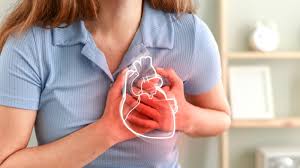Heart attack is a commonly seen heart problem across the world, approximately 18.6 million cases of heart attack are reported in a year. It is also called myocardial infarction life life-threatening heart attack occurs when the blood flowing in our body is blocked in a part of the heart. The blockage of blood flow may be sudden and severe it also damages the heart muscle.

Signs and symptoms of Heart Attack are as follows:
Recognizing the signs and symptoms of a heart attack is fundamental for a legitimate and effective treatment. The signs and symptoms can be different from person to person the common symptoms are:
Chest Pain or discomfort:
Chest pain is the main symptom of a heart attack. The pain can be felt like a heavy tight around the heart maybe for a long time or may go away within some time.
Body Pains:
Pain in the palms, neck, jaw, or stomach may be a symptom or a chance of a heart attack. A few individuals may encounter pain in these parts without any heart issues. So, it is way better to visit a specialist as long as you see any indications of heart issues or to diagnose it as early as possible.
Shortness of Breath:
Breathlessness is also a symptom of heart attack, along with this nausea, vomiting, and indigestion can also be seen in a few people. Heavy sweating and cold sweats are also symptoms of a heart attack. Feeling faint or dizzy can also be a signal of a heart attack.

It's important to note that not everyone encounters all of those signs and symptoms, and a few can have signs that are much less usual. Ladies, particularly, can have indications that are ordinarily related to heart attacks, such as fatigue, dizziness, or unexplained weakness.
What are the causes of heart attacks?
As mentioned above heart attacks occur due to the blockage of an artery that supplies oxygenated blood to the heart. The blockage occurred due to a variety of factors such as the build-up of plaque and fat. If this plaque is cracked then it leads to the formation of a blood clot that completely blocks blood flow to the heart.
The factors that increase the chance of plaque buildup are as follows:
Blood pressure & Diabetes:
Due to the increased pressure in the blood vessels, the artery walls are damaged leading to the build-up of plaque, also diabetes can also result in plaque build-up.
Obesity & lack of physical activity:
Being overweight and not being able to stay active in any physical activity can also result in a heart attack.
Higher levels of bad cholesterol and smoking can also lead to plaque build-up and heart attack.

Overeating & Stress:
Excessive eating of fat-containing foods and sodium-containing foods can lead to plaque buildup. Stress can also increase blood pressure leading to heart attacks.

Treatment procedure for heart attack:
The treatment procedure can clear the flow of blood to heart muscle and reduce the severity of heart attack. Here is the treatment process for heart attack:
Medicines:
Ibuprofen and other antiplatelet capsules offer assistance to prevent blood clots from getting severe. Thrombolytic capsules (clot busters) can be endorsed to break up the clot that's blocking an artery way. Other drugs, including beta-blockers, Pro inhibitors, and statins, can be endorsed to stabilize the risk components influencing the heart.
Angioplasty and Stents:
In this case, a catheter with a balloon at its tip is embedded into the blocked artery. The balloon is inflated to widen the artery, and a stent (a little mesh tube) can be set to keep the course open and prevent the blockage.
Bypass Surgery:
Bypass surgery is recommended when more than two arteries are damaged, and also when angioplasty is not possible. The blocked arteries are replaced with healthy blood vessels in other parts of the body for the flow of blood to the heart.
Lifestyle Changes:
Following healthy lifestyle habits such as including a balanced diet, managing a healthy weight reducing smoking drinking, reducing stress, and managing lifestyle diseases such as diabetes and blood pressure can help in managing heart attacks.
By understanding the symptoms, causes and management procedures people can manage the condition more effectively. Following a heart-healthy lifestyle and regular consultation with your heart doctor can also best help you in such a condition.

